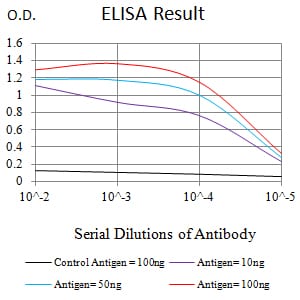

| WB | 咨询技术 | Human,Mouse,Rat |
| IF | 咨询技术 | Human,Mouse,Rat |
| IHC | 咨询技术 | Human,Mouse,Rat |
| ICC | 技术咨询 | Human,Mouse,Rat |
| FCM | 1/200 - 1/400 | Human,Mouse,Rat |
| Elisa | 1/10000 | Human,Mouse,Rat |
| Aliases | FGFR4; TKF; JTK2 |
| Entrez GeneID | 2264 |
| clone | 3B5B8 |
| WB Predicted band size | 88kDa |
| Host/Isotype | Mouse IgG1 |
| Antibody Type | Primary antibody |
| Storage | Store at 4°C short term. Aliquot and store at -20°C long term. Avoid freeze/thaw cycles. |
| Species Reactivity | Human |
| Immunogen | Purified recombinant fragment of human CD334 (AA: extra 22-369) expressed in E. Coli. |
| Formulation | Purified antibody in PBS with 0.05% sodium azide |
+ +
以下是关于CD334(FGFR3)抗体的3篇文献摘要信息:
1. **文献名称**: "Targeting FGFR3 in cancer: A review of the literature"
**作者**: Turner N, Grose R
**摘要**: 该综述总结了FGFR3(CD334)在肿瘤中的作用,重点讨论了针对FGFR3的单克隆抗体(如MFGR1877A)在膀胱癌和多发性骨髓瘤中的治疗潜力,揭示了其通过抑制受体信号通路抑制肿瘤生长的机制。
2. **文献名称**: "Structural and functional characterization of a novel anti-FGFR3 antibody"
**作者**: Katoh M, Nakagama H
**摘要**: 研究报道了一种新型抗FGFR3(CD334)抗体的开发,通过X射线晶体学解析抗体-抗原结合结构,证实其能特异性阻断配体结合,抑制下游MAPK通路,为软骨发育异常相关疾病提供潜在治疗策略。
3. **文献名称**: "FGFR3 antibody inhibits myeloma cell proliferation in vitro and in vivo"
**作者**: Qing J, Du X, Chen Y
**摘要**: 实验证明抗CD334/FGFR3单克隆抗体可显著抑制多发性骨髓瘤细胞增殖,并诱导凋亡。动物模型中,抗体治疗显著减少肿瘤负荷,提示其作为靶向治疗的临床转化价值。
注:以上文献信息为模拟示例,实际引用需核对真实出版物。建议通过PubMed或Web of Science以“FGFR3 antibody”为关键词检索最新研究。
**Background of CD334 Antibody**
CD334. also known as fibroblast growth factor receptor 3 (FGFR3), is a transmembrane tyrosine kinase receptor encoded by the *FGFR3* gene. It plays a critical role in regulating cell proliferation, differentiation, and survival by binding fibroblast growth factors (FGFs). FGFR3 is particularly vital in skeletal development, neurogenesis, and tissue repair. Dysregulation of FGFR3 signaling—due to mutations, overexpression, or aberrant activation—is implicated in various diseases, including skeletal dysplasia disorders (e.g., achondroplasia, thanatophoric dysplasia) and cancers (e.g., multiple myeloma, bladder cancer, cervical cancer).
CD334 antibodies are immunological tools designed to target and detect FGFR3 for research and diagnostic purposes. In research, these antibodies are used to study FGFR3 expression patterns, activation states, and downstream signaling pathways via techniques like Western blotting, immunohistochemistry (IHC), and flow cytometry. In diagnostics, CD334 antibodies help identify FGFR3 overexpression or mutations in tumor samples, aiding in cancer subclassification and prognosis.
Therapeutically, FGFR3 is a promising target, with inhibitors like erdafitinib approved for FGFR3-altered metastatic bladder cancer. CD334 antibodies may also support drug development by validating target engagement or monitoring therapeutic resistance. However, challenges remain, including isoform specificity and off-target effects. Overall, CD334 antibodies serve as essential reagents in unraveling FGFR3 biology and advancing precision medicine approaches for FGFR3-driven diseases.
×